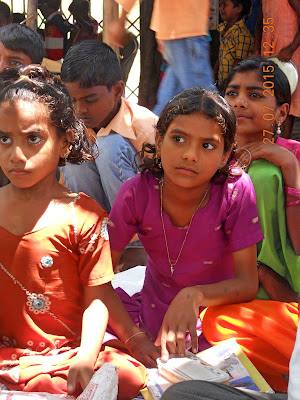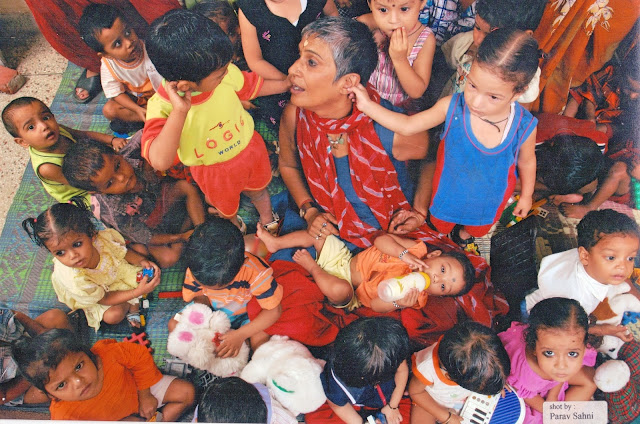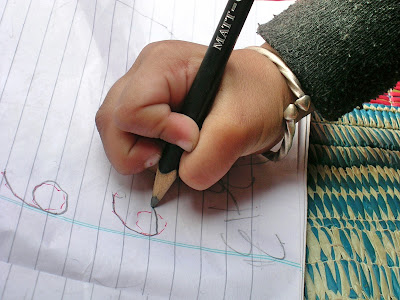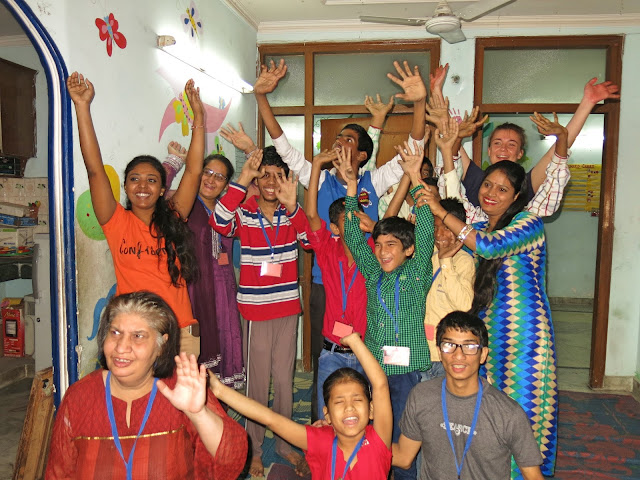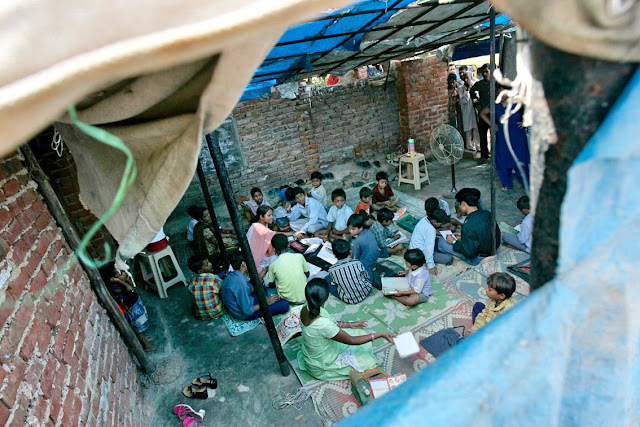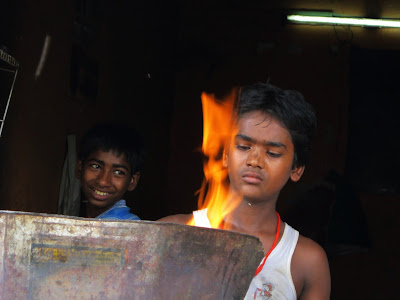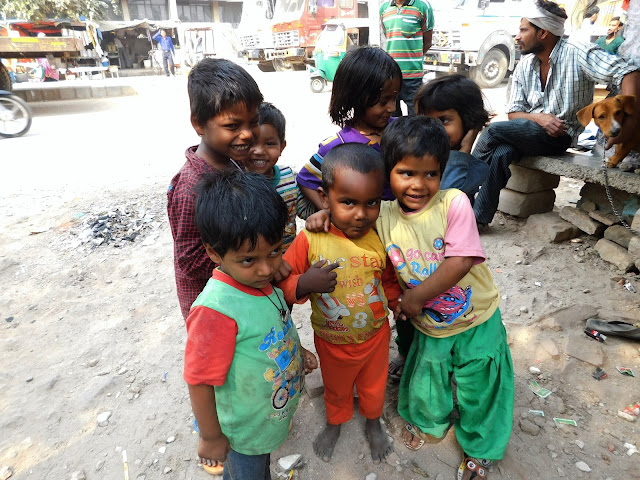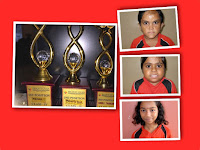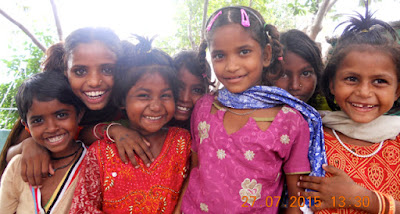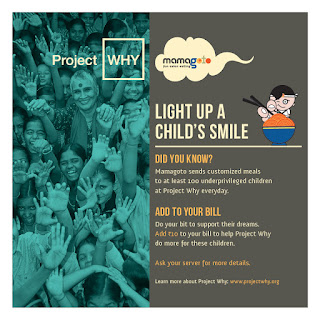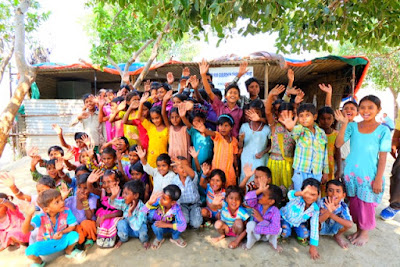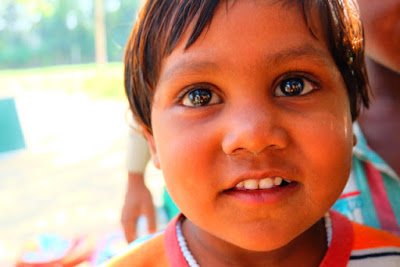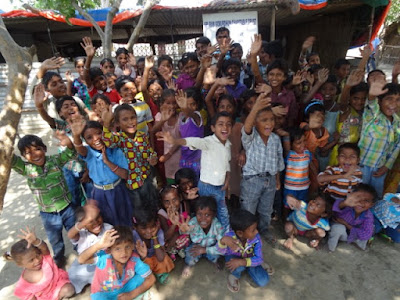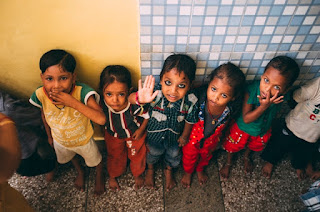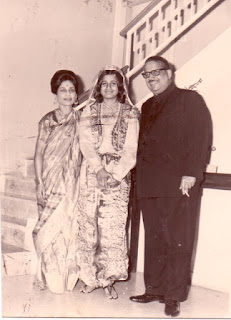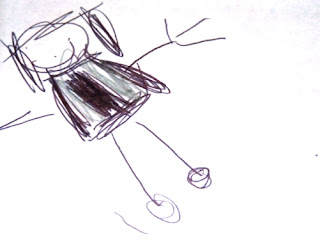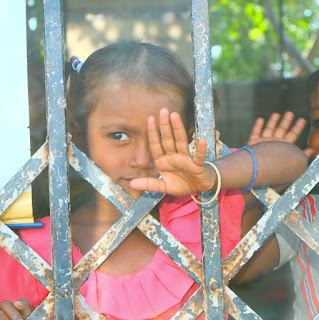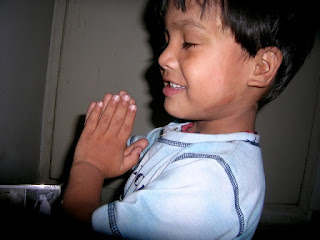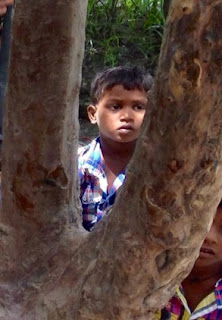Gypsy Souls #ThrowbackThursday
| If we exist then He exists; if we do not then how can He! (on the existence God) Tau Head of the Rana Pratap Lohar Camp |
“Have you ever met someone for the first time, but in your heart you feel as if you’ve met them before?” wrote JoAnne Kendrick. This is exactly the feeling Project Why had when it first saw the Lohars of Rana Pratap camp.
The Lohars are a nomadic Indian tribe of ironsmiths. They hail from Rajasthan (Chittorgarh) where they accompanied the ruler in battle to repair arms and shoe horses. When Maharana Pratap Singh lost the battle of Haldigath in 1576 and went into exile, the Gadia Lohars swore to wander and never settle. And they have been wandering ever since. After independence in 1947, about 100 clans came to Delhi and settled in different parts of the city, along roadsides where they continued to practice their trades and live under the sky. One such camp was located close to Project Why.
It was in 2005 that Project Why first saw the children of the camp and was completely bowled over. These were bright kids with sparkling, eager eyes and smiles to die for. Unlike other children they seemed fearless and eager to connect. Here was another Why that needed to be answered but there was a hitch: convince Tau, the Head of the Clan.
It took a few minutes for Anou to succumb to the wisdom and kindness of this gentle soul. An unlikely yet real friendship was born between them. For the 5 years the camp remained standing, Anou would often go missing to be found sipping tea and in deep conversation with Tau.
Life in these makeshift camps in not easy. The camp is located next to a red light where cars rev and the air is foul. And yet over 100 people, old and young lived there with utmost dignity. They never stopped smiling. Never mind if water had to be carried across a busy road; never mind if every so often the authorities came and destroyed the camp in a cat and mouse game that had its own rules; never mind the bitter cold or scorching heat that entered their flimsy homes. Life was a celebration and who better than gypsies to celebrate life to its fullest.
If the men beat the iron it is left to the women to sell the wares. The money collected would determine what would be eaten in the evening.
Project Why ran a creche and a primary centre for the children of this camp and it was a joy to teach these eager beavers.
That is not where it ends. The plight of these people and the discovery that there were promises made to them- as validated by the few scraps of official papers that had survived the many destructions of the camp- led Project Why to taken on its first activist challenge. A PIL (public interest litigation) was filed in the High Court. Sadly nothing came of it.
The Lohars of Rana Pratap camp survived many destructions but the Commonwealth Games in 2010 would be their nemesis, as the camp would be destroyed and the 30 odd families scattered across the city.
The stretch of road where they lived that was such a vibrant and happy place is now a stretch of sidewalk. Each time one drives past, one is overwhelmed by a feeling of loss and sadness. The Lohars are missed dearly by all at Project Why.
Nomads always move on, don’t they
You can share some glimpses of their lives in these images.
Mercury Rising #GivingTuesday
| waiting for water |
This picture was taken near the Project Why Okhla Centre at the time when the tanker delivers water for an entire community. This is when children dash out of class to reach the tanker in time, having already placed their buckets or cans well in advance. This is also when we do not interfere, as Project Why is no match for WATER!
In most slums in Delhi taps run dry in summer and water is supplied through tankers. You have to fill enough water for all household chores until the next tanker arrives. For those of us who have access to tap water and the means to create sufficient back up, it is impossible to imagine what it means to survive with a few pans of water.
The heat is on and the mercury is rising. It touched 44 C a few days back. A few moments in this scorching heat is enough to send your head spinning and make you long for an air conditioned room. Some of us have that luxury, but for those living in slums the story is different.
Many of the homes in the slums have corrugated iron or asbestos roofs and ceilings that are so low an adult cannot stand. The only opening is the door. There are no windows or any form of ventilation. The tiny space is often shared by five or six people.
In the day these tenements turn into ovens, making it impossible to sit inside them. This is when women sit outside their doors, the men simply go out, the children run around in the sun. The sky is better than an asbestos sheet.
Project Why is a place where children can come to stay cool. The space is large; we have fans and coolers to provide respite and a place to study. That is one of the reasons why from day one, Project Why decided to remain open during the summer holidays as that is a time when children need us most. Boys and girls come together and as many have gone to the villages, we are able to accommodate the ones who stayed behind.
Summer is another moment which requires the survival tactics of those who have so little. Complaints are few if any and smiles are ever present.
| a house in the slum |
| Durga’s home |
| welcome drink |
| cooling in the park |
| Ice cream man |
| orange juice to the rescue |
Project Why’s Women centre # Throwback Thursday
The Project Why Women and Children Centre saw the light of day to answer yet another deafening why. It was 2006 and we had two women in a desperate state who needed help. One woman was ready to get out of rehab and needed a safe place to stay, a kind of midway home. The other needed financial assistance for a hip surgery, but more than that, needed a place where she could stay during her recovery. And here began the story of the Project Why Women and Children Centre, one that grew organically like all else at Project Why.
The first hurdle was to find a place for these two women to stay. Easier said than done. In India women from the lower strata who drink and suffer from mental conditions or women who are HIV+ are not welcome anywhere, and in a land where nothing remains a secret you cannot hide reality for long. In the span of a few months we had to move three times! This could not continue. Our two ladies still needed help and a solution was critical.
After much thought we decided to alter the approach and expand the scope of our intervention. The only way to be accepted in a community was to answer a need and often children were the ones who helped get acceptance. The rest is history.
A quaint building was found where one wing was perfect for a residential programme and the other was ideal for a children’s centre akin to the ones Project Why already ran. It worked.
When the two ladies were ready to take leave and resume their lives, Project Why decided to again alter the women’s outreach and use the space vacated to run vocational programmes. Stitching and Beautician Training were the two skills Project Why chose, as they enabled women to work either outside or within their homes, as many come from traditional families.
For the children Project Why ran an after school programme.
The Project Why Women and Children Centre is a no-frills affair. Space is used judiciously and the terrace has been turned into a space where multiple classes are held simultaneously. On the children’s request computer classes were started and the computer section is also a big hit with some of the ladies.
The Project Why Women and Children Centre is a vibrant and spirited place where women and children are busy transforming their lives.
The Project Why Women Centre is a large family of 300 children, 150 women and 15 staff members under the patient but firm direction of Dharmendra.
Enjoy some glimpses of the Project Why Women and Children Centre.
 |
| Dharmendra in charge |
 |
| Classroom being set up |
 |
| Class in session |
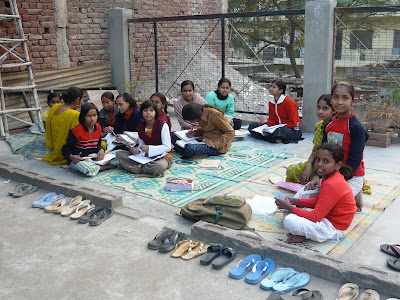 |
| Class in session |
 |
| Showtime |
 |
| Computer Class |
 |
| Stitching Class |
 |
| Learning to repair the sewing machine |
 |
| Pedicure |
 |
| Facial |
 |
| Women’s meeting |
India’s shadow education cont #GivingTuesday #India # Education
Recently some of our secondary Govindpuri children informed us that they may have to stop coming. Why?
These were some of the brightest of the lot who attend government school. The reason they gave was shocking. Their school teacher had told them that unless they attend the tuition classes he gives, they would not pass in the subject. This of course costs 1000 Rs a month. The children are devastated and so are we. 1000 Rs multiplied by the large number of students in a state-run school classroom is good money.
And this too seems to be an accepted norm as we were told that in another government school 80% of the class failed a particular subject and were told that if they wanted to pass the supplementary examination at the end of the summer holiday the students HAD to attend the tuition the teacher would be giving during the holidays. The less said the better.
This shadow education is a true reflection of the social strata of India and hence it goes from über expensive teachers that come to über rich homes to expensive tuition given in the tutors’ home, to group tuitions in air conditioned swanky classrooms to spaces like Project Why. Every one has a commensurate price tag of course.
Children as young as 6 ‘go for tuition’ everyday, often to a local tutor. The price tag for such support is around 600 to 1000 Rs a month and if you have more than one child then it is often the boy who is sent and the girl kept back. As the child grows the tag becomes costlier as then you are charged per subject at a rate of 1000 or more Rs for 3 sessions a week.
What is worrying is that this ‘shadow’ system seems to be here to stay. The very basis on which it stands is faulty as it presumes that the hours spent in school are not sufficient if one wants to succeed. The hard day school hours are its cornerstone.
Education does not stop at academics but with this dual schooling there does not seem to be much time left for anything else. When does the child play, read books, meets friends or relax?All these are essential for wholesome growth.
One hopes that decision makers will look at this aspect when the next reforms are envisaged.
Project Why’s Neverland #ThrowbackThursday
We realised this was a daily routine: the mother would pull the charpoy outside the family’s jhuggi, lock the door, tie the toddler, kiss him fondly and leave. A few hours later she was back and would smother the baby with kisses as she untied him and carried him away. Something did not fit. The violence of the action (as we perceived it) did not match the love this young mum seemed to have for her child. There had to be a reason.
The mother worked and there was no safe place to leave her child. Any childcare cost more than her meagre salary and government-sponsored education only begins when the child is six. The mother had to find a solution and this was the best she had. It had its own logic. Tying the child with a scarf long enough for him to move around ensured that he would not stray away on busy streets. Placing the cot outside meant the child was watched as this was a street where people mostly live outside and there is always someone around. Hugging and kissing him was her way of showing him she cared.
What would you have done?
Needless to say this one incident was sufficient for Project Why to begin its early education programme and, like all else, the creche began with makeshift resources. The tiny space in front of the office where staff convened was emptied and turned into the first creche. A few mats, a few toys garnered from friends and a young local woman who was willing to teach: that was all we needed.
The Project Why creche is a wonderful place; even father Xmas knows that!
Over the years many children have “graduated” from the Project Why creche and entered school. Many come to one of our centres for after-school support. We feel a sense of pride at seeing all these little children ready to take on their future but at the same time feel sad because there are so many children who are not able to aspire to education and a better future. We wish we could do more.
The creche is Project Why’s Neverland. The children are eternally tiny and the moment any adults steps into the classroom, they too become children, filled by the laughter and joy the children share. It is the world of Peter Pan where smiles abound and laughter is ever-present.
India’s Shadow Education Centre #GivingTuesday
Why is Project Why even necessary?
Sadly, this is a question we often get. There are many reasons, but the main reason is to provide shadow education to underprivileged children, an education that has become sine-qua-non to success in India.
Shadow education is a term coined to encompass all private coaching and tuition outside of but parallel to the mainstream education. The statistics are mind-boggling: over 71 million students take some form of outside coaching in India today, which comes at a staggering cost. The main reason given during a survey was to ‘augment basic education.’ Both rich and poor parents estimated that education given in school was not adequate. Supplementary education has become a requirement.
Parents from poorer homes are aware of the poor quality of education imparted by government schools with overcrowded classes and few resources. But not all are able to pay for supplementary education, which comes at a steep price. Very often boys are sent to private tuitions and girls are not. Education for girls is not considered important.
Project Why provides this supplementary education for free and, yes, this is extremely relevant and needed for slum communities. Children come to Project Why outside school hours and teachers ensure that they are taught everything that needs to be learnt. At Project Why, children are taught in small groups and the teachers make sure they understand and comprehend what they are learning. Project Why teachers are patient, caring and students feel confident and loved.
Interventions like Project Why are crucial. This is demonstrated by cases like a young class V student who could barely read or write when she came to us. This same girl topped her class VII.
In India education is marks-oriented and thus performing well makes all the difference in getting access to higher education. Private institutions of higher learning have proliferated in recent years but these come at a high cost and are not an option for slum children. Admission to state-run colleges is based on marks. The option available to underprivileged students if they do not meet the required cut offs are evening colleges or distance learning institutes. Not the ideal.
We need education reform that would introduce vocational skills in high school that would make entry into the job market easier. Till then all children, rich and poor, have to compete on a level playing field to get into University. The problem is, this level field doesn’t extend to the quality of primary and secondary education. Project Why allows our students to have a chance at succeeding.
Project Why’s very special class #ThrowbackThursday
This is Project Why’s special class as it is today. And here is how it looked in earlier times.
Project Why’s water warriors #GivingTuesday
Did you know that 5,000 children die everyday from water related diseases?
There is an odd phenomenon at Project Why where children, often girls, get up in the middle of a class and leave in a rush. Our teachers finally why and the answer they received was: “it is time for the water to come.” In many slums, water comes in a communal tank for a fixed amount of time so all abled bodied people- children included- are needed to fill as many receptacles a possible.
Different containers for different needs: drinking, cooking, cleaning, washing, etc. In some areas water comes on alternate days and so the need of keeping water clean is imperative. Sadly, the water does not often remain clean and that reason why so many children under the age of 5 die of water related disease.
A picture is worth a thousand words, but a memory is priceless #ThrowbackThursday
She lived in the tiny tenements that are tucked away between factories in the industrial area of Okhla. In those areas most parents work long hours and children are left to their own devices, becoming targets for lurking predators who find them easy prey to steal and to push drugs.
Needless to say Project Why was on board! The problem was that in such areas there are no empty spaces to rent or use and it was left to the ladies to find space.
The two ladies were back the next day, huge smiles on their faces and the news that they had found a space and even got permission from the local cops and politician. It was a garbage dump close to the railway line. No problem. We would reclaim it.
Spair Grace soup and Lemon Grace Tea #GivingTuesday
Spare Grace, Lemongrace, Red Cabies and Badycon were the words proudly displayed by the local vegetable shop now catering to the growing expat clientele. To the uninitiated this translates as asparagus, lemongrass, red cabbage and baby corn!
India is a land with a multitude of languages but English has become the administrative language and is quickly becoming a vernacular language as well. Today, even the poorest parents understand the necessity of English for their child to succeed, and as a result signs reading “ENGLISH MEDIUM” dot the city.
So do all Indians speak good English then? The answer is no.
English medium schools in poorer areas often do not employ teachers who speak English- at least not a form of English a fluent speaker would recognise.
The job market today requires a working knowledge of English and the students at Project Why rely on our resources for their English education. Project Why relies on the resources of our dedicated volunteers and on workshops.
Recently we bid farewell to Eva who taught the Okhla teachers and children for one year. Her intervention went a long way in building confidence in the teachers. The importance of volunteers able to teach English cannot be stressed enough.
n January 2016, Damyanti held a week-long spoken English workshop under the aegis of the Book Council of Singapore that culminated in a bi-lingual poetry and story reading event. The use of pod casting has helped us continue this venture and we have regular in-house reading events.
Project Why has adopted these measures to help teach our children English. What ideas do YOU have for expanding English literacy?
Do you think English is a skill that spells success?
Do you think children from deprived homes should learn English?
Can YOU come to Project Why to help teach our children?
Celebrating Project Why What have you celebrated this week #socialgood
Sometimes you do not have to look far to find things to celebrate. You simply have to look with your heart. I sometimes kick myself for not taking time to simply stop and savour things around me, more so because I’m blessed to have Project Why which is a constant source of celebration. This week I did just that by slowly browsing the pictures taken in the last seven days.
There was much to celebrate, from the birthday party of a young girl who has chosen to mark her special day year after year by giving a special treat to the students of our special section.
Let us shift gears and peek at the little ones. Silence please, kids at work. Some are creating,
Please join Project Why on its
Do Indian Children have the right to dream? #GivingTuesday #India
Child labour is cheap. A child is submissive, and can be made to work under poorly lit and poorly ventilated spaces.
A child can be used for stitching, embroidering, weaving rugs and carpets, making matchsticks and firecrackers, and rolling beedis in backbreaking conditions.
The Child Labour (Prohibition and Regulation) Act, 1986 is being amended and is now in Parliament. According to Nobel Laureate Kailash Satyarthi, two of these amendments may defeat the very purpose of the Act.
The first is the one allows children below 14 to work in family enterprises.
Helping out after school is acceptable when it is truly a family business, but what stops anyone from exploiting this law? Anyone can claim a child as ‘family’ in the Indian poor classes, and even if a child is truly family, it is hard to ensure he or she will be sent to school once this amendment comes into force. Most of the children that land up in big cities are often brought by ‘uncles’ from the village who turn out to be middle men and traffickers. When Project Why opened our Yamuna centre we were faced with parents coming during class and asking for the child as she/he was needed to pluck vegetables. It took us a long time to get make the parents understand.
Another amendment is even more detrimental to child rights. At present, Child Labour law prohibits employment of a child in 18 occupations and 65 processes. The proposed new amendment reduces the prohibited occupations to three: Mines, Inflammable substances and Explosives. So the children under 15 working in ‘family-run’ businesses like domestic work, bead-making, carpet-weaving will be legal.
The question that needs to be asked is whether the child making beedis in his family business will be able to go to school? The only caveat one can think of is to define ‘family’ and limit it to parents and legal guardians, but in India, where the record of implementation is very low, that seems impossible. Children can help their families and even learn their skills but this should not come in the way of their health, education and leisure time. But these options aren’t available to the poorest of the poor.
Sanjay, a Project Why alumni, a gypsy ironsmith’s son, and a Project Why teacher, today walks the ramp in the world’s fashion capital, Paris. That was possible because his family allowed him to study and work in a trade other than theirs. Sanjay made his dream come true.
Project Why is a place where children are given the RIGHT TO DREAM.
Do you think that every child has the right to dream, and dream BIG? In a country like India, should children under 14 be allowed to help in family enterprises? Should any child, under or above 14 be allowed to work in factories making matchsticks or firecrackers or as domestic help?
Have You Heard about This Extraordinary Boy Named Utpal? #socialgood
There is so much to celebrate at Project Why each and every day, but this week was a very special celebration: Utpal’s 14th! To the uninitiated it would have looked like any birthday with cakes and candles and singing and cheering. However, Utpal is a very special child.
The women of Project Why #PledgeforParity #GivingTuesday
 |
| The project Why Women |
Project Why is primarily a children’s organization yet right from the beginning, we instinctively reached out to women, the true game changers. No wonder then that it was a woman who helped me seed Project Why.
Mataji, the formidable local healer and Rani’s mom, whom I had gone to meet to ‘cure’ an everlasting depression post my parent’s demise did so with a few words: Do something your parents would be proud of. With those words, depression and accompanying backache flew out of the window and Project Why was born and so were the women of Project Why.
A slightly diffident and shy Rani jumped at the chance of working for Project Why and stayed on: a sterling leader of Porject Why. Today she runs a large part of the Project. When we needed teachers, we first looked at the women around us. We found many who had several years of schooling but had dropped out because of an early marriage.
It is sad but true that the parents in underprivileged homes in India want their daughters to marry, above all. After marriage, very few can continue with their education. Project Why gave many such women a second chance at education, and more than that, at employment– something they’d never dared dream of.
Some of these incredible ladies grabbed the opportunity with both hands and went on to complete their schooling and study further. Many obtained graduation degrees. Today, 30 women form part of our team. Some have been with us since day one.
Project Why believes that women should be financially independent, so vocational courses were started at the Women’s Centre in 2006. Today over 120 women attend our six-month course on beauty and tailoring. Several hundreds have benefited and are today gainfully employed either as small entrepreneurs or employed in factories and beauty parlors. We organize regular meetings with the women where we share our thoughts on social issues like child beating, gender equality, early marriage, nutrition, women’s rights etc.
 |
| adult literacy class |
We hold compulsory adult literacy classes for all women who register for our vocational courses. No one receives a certification unless they clear the adult literacy course. The literate women are given spoken-English classes.
Over the years, Project Why has reached out to women in a variety of ways. Nutrition for pregnant women and lactating mothers. Care for a woman who had contracted bone TB and would have become paraplegic unless she spent six months on a bed– today she works in a beauty parlour. Support for omen who suffered injuries and needed care, women undergoing rehab who needed a place to heal.
The women of Project Why come with different stories, but they have one thing in common: an indomitable spirit. Project Why encourages this spirit: women are given all the support they need in order to flourish in New Delhi, and this is our #PledgeforParity this year.
Would you consider helping these underprivileged women? Even a small amount goes a long way towards helping these women find a new life.
To donate follow this link!
What have you been grateful for this week? #socialgood
Will You Help these Children Go to School? #GivingTuesday #Nonprofit
I came across this bunch of happy kids right in front of our Okhla centre at Project Why. They were shy at first, but then it took no time for them to smile and perform for the camera. They made faces and giggled, just being kids!
Street children break my heart: the happier they look the more downcast I feel. It is the sight of such children that inspired the setting up of Project Why 16 years ago. Children have a right to their own space and Project Why is just that: a space where children can be children.
You might wonder why these kids are not part of the Project Why family. The answer is simple: our classes are full to capacity though I couldn’t resist asking whether these few kids could be adjusted in our Govindpuri crèche, the only crèche we run.
But what about the others, the ones who are not seen in this picture?
Slum kids live in environments where everything is a danger: from the rabid street dog to the speeding vehicles, from the filthy water discharged by the factory next door into the drain that runs in front of their homes, to the lurking predators in search of little hands to steal, or push drugs. This is one of the reasons we set up the Project Why Okhla centre.
Malnutrition cannot be reversed passed age 5; you cannot enter a school after a certain age; social and other skills are best learnt in the formative years. The list is endless. The child today cannot wait for tomorrow. This is why we at Project Why try and squeeze as many kids as possible, doing away with frills like desks and chairs and opting for the mats where it is easy to pack in a few more.
It takes only 100 Dollars or 7000 Rupees to support a child at Project Why for an entire year.
Would you consider donating 100 Dollars or 7000 Rupees each year to help build these futures?
Could you give us a Like on the Project Why Facebook Page to help raise the numbers for our future Crowdfunding campaigns?
Or, if you stay in New Delhi, would you consider volunteering at Project Why to teach these kids anything from art, to English or Maths, or any other skill that you can share?
Will you help these kids claim their childhood back?
Should Street-kids go to Boarding School? #GivingTuesday #India
Is it possible for a child from the slums to shine at an exclusive boarding school?
It sounds like a rude question, but wait till you’ve heard about the Project Why Power Girls.
Meet Meher, Manisha and Babli.
 |
| Meher |
Meher, who topped her class is a third degree burn survivor born into a very poor family. The fingers in both her hands were fused as a result of her accident, which led to her being abandoned on the streets at the age of three. Project Why found her scavenging in discarded plates strewn next to the local sweetshop. Everyone fell in love with this bright, determined and impish child and her near-say-die attitude. A volunteer present at that time had contacts with doctors and access to funds, and was able to help with reconstructive surgery on Meher’s hands. Once she healed and got back the use of her hands, off she went to boarding school.
 |
| Babli |
Babli came to Project Why we realised she needed reconstructive cardiac surgery to mend a hole in her heart. A little woman of substance who dreamt big despite being barely able to breathe: Babli wanted to be a ‘police’! A magical network of volunteers and donors helped her to surgery. Upon recovery, she was put to work by her parents, a problem to which Project Why could find the one solution again, like Meher. The boarding school.
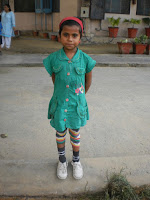 |
| Manisha |
Manisha was a student of our crèche. She came from a very poor parents. Ragpicking and alcoholism meant they couldn’t give Manisha a good upbringing. One of our donors, having heard about our boarding school programme at the time, wanted to sponsor a little girl. Everyone at Project Why believed Manisha should be the one.
Project Why’s Boarding School Programme symbolises everything Project Why stands for and believes in: every child’s right to quality education in an enabling environment. A proponent of the neighbourhood common school, Project Why believes that children form different social and economic backgrounds should study together, each one learning from the other.
Sending these girls to boarding school ensured just that.
Last week at their school’s Annual Day, Meher, Babli and Manisha, our Power Girls stood 1st, 2nd and 3rd in their respective classes.
For us, it was a dual celebration.
We saw the usual luminaries and guests, the speeches, the cultural programme and everything that happens on such occasions, but also two very special moments: the prize distribution and the dinner.
During these, a bunch of proud parents belonging to the poorest strata of society not only shared the space with the high and mighty but were the parents of three incredible, prize-winning girls.
For that instant, all barriers fell, all lines were obliterated and it did not matter who you were or where you came from. It was magical.
Do you think education should be equal for all children? What would you say to Meher, Babli and Manisha? Would you like to sponsor a child to go to boarding school?
 |
| Meher Manisha Babli |
To know more about these girls:
Life on a planet is born of woman
A tiny woman of substance
A perfect day
My never fail feel good shot
Huge eyes in a scarred face
The key to her morrows
I am here to stay
Please join Project Why on its Facebook Page.
You can also follow us on Twitter
Even the smallest donation makes a difference. Support Project Why here
What is the secret to happiness #GivingTuesday #India
We all want to be happy; the question is whether or not we achieve this goal. In a recent post Damyanti Biswas, an Indian writer based in Singapore and friend of Project Why, shares how a bunch of very special souls gave her an insight into how to find happiness. She writes: “These people know how to find happiness in the smallest of things, and if you spend some time with them, they’ll teach you, too. I felt much lighter for having spent some time with them.” She then goes on to ask, “What is the secret to happiness? Is it outside of you, or is it your choice?”
Is happiness as elusive as we think?
In a delightful and touching fable, The Little Prince, St Exupery gives us a formula to happiness: “It is only with the heart that one can see rightly; what is essential is invisible to the eye. Happiness is only visible to the heart.”
Seeing with the heart is Project Why’s maxim and over the years we have always abided by this rule. We go beyond definitions and mission statements to craft our own unique ways of looking at challenges and then surmounting the challenges.
When you are with the children time and space take on a different meaning. As you share their laughter you forget the yesterdays and tomorrows and savour pure unadulterated joy as time stands still. But more than that you experience an under valued feeling: gratitude. The children of Project Why’s special section symbolise gratitude; they are grateful to exist. And that is why there is not a single mean bone in their bodies.
To be truly happy, you have to be grateful, something we tend to be forget.
The secret of happiness lies both inside and outside of you. As you open the eyes of your heart and view every day events through your new eyes, your ability to be happy and joyful seem to increase by quantum leaps.
Happiness is in the smallest of things: in the smile of a child as she greets you; in the report card proudly presented by a child who had earlier failed; in the English poem recited with flair; in the first word uttered by a child who could not speak. The list is endless. You just have to know where to look.
At Project Why we are busy being grateful and thus happy.
How do YOU think gratitude and happiness are connected?
What is your personal experience?
You can also follow us on Twitter
Even the smallest donation makes a difference. Support Project Why here
Legislating Change #GivingTuesday #India
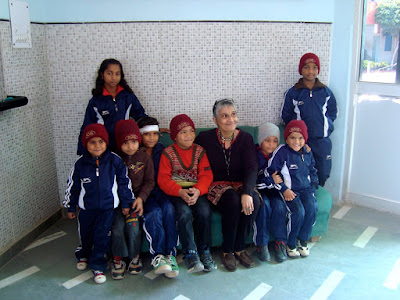 |
| Anna Ma’am and her boarding school stars: from left to right Manisha, Aditya, Vicky, Utpal and Yash standing: Babli and Nikhil |
The quota debate is back. A statutory government panel has advised enacting legislation that would make it mandatory for private companies to reserve 27% of all jobs for marginalised communities. The quota system is affirmative action to help people from deprived backgrounds and is used in education and government employment. The proposed law aims at extending affirmative action to private businesses, including philanthropic organisations.
But what happens when a young woman whose father is a senior diplomat and who has studied in Ivy League colleges applies for a job under the reserved category?
In our own experience when Project Why took the decision to source all of our staff from within the community we never gave a thought to affirmative action or quotas; we were looking at skills and talent. We have never regretted this choice. They have walked the extra mile and proved their worth. All our teachers needed was the opportunity; they did the rest. Project Why’s achievements are proof of that.
Is affirmative action that same as sourcing from the community?
When Project WHY decided to send eight extremely deprived children to a English medium boarding school; that was a form of affirmative action. However, we did not throw them into the lion’s den. We rented a flat and kept them with us for one year. We registered them in an English medium pre-school where they learned basic English. At the flat we gave them the skills they would need: eating on a dining table with cutlery, sleeping alone in a bed, manners, using a bathroom and so on. And, in order to make sure they would not feel alienated we also introduced them to all that a boarding school kid would love: pizza, hamburgers, GI Joes, Barbies and what not.
When the day came, these little souls walked into their new world confident and sure of themselves. Today they are admired for who they have become; they are at the top of their classes, excel in sports, and love creative activities. There has been no looking back. Their caste and class does not matter anymore.
Was affirmative action the right choice for us to make?
Will the quota system really support those in need?
Will the quotas create a larger divide?
What are your thoughts on the quota issue? Should there be affirmative action beyond education?
Please join Project Why on its Facebook Page.
You can also follow us on Twitter
Even the smallest donation makes a difference. Support Project Why here
How do we raise our Children to have Compassion and Empathy? #GivingTuesday #India
Recently, Project Why received a donation from a school in broken cartons and torn plastic bags.
We received books with pages missing, copybooks with not a single blank page, and unwearable clothes. The clothes were not washed let alone ironed and some were torn.
Students had been asked to donate what they didn’t use anymore: school books, bags and clothes gone too small. The children gave abundantly, because children are generous by nature, a feature that needs to be fostered by positive example.
Our questions can be very simple: should this have happened?
Did the school staff and the parents step back to imagine how a child receiving these would feel?
This was an opportunity the parents and the school could have used to demonstrate to their children how an act of charity should be made. What is certain is that charity is a two way street. When you give something you also need to give a bit of yourself. The children from both sides lost an opportunity to experience giving and generosity.
If all the clothes were wearable and folded, all the books and notebooks usable and intact, the cartons taped and the bags sealed, what would the children at that school have learnt? Was this a missed opportunity here to educate our children, on both sides of the divide?
Do you have any ideas about how this could be done? How do you teach compassion to your kids? How did your parents teach you? Share your stories and comments.
Please join Project Why on its Facebook Page.
You can also follow us on Twitter
Even the smallest donation makes a difference. Support Project Why here
Does #India want its children to be branded by birth ? #GivingTuesday
The past days have seen many Indian dreams smothered before time.
Three young girls ended their lives by jumping in a well. A young Dalit scholar ended his life in the hope of rekindling his battle. These lives were sacrificed at the altar of our indifference to the plight of those who live on the other side of the fence we call the ‘poor.’ These include the economically, socially and otherwise challenged or those who we feel are different from us. You simply do not see, hear or speak about them.
To be merely acknowledged they have to scream themselves hoarse till the day they realise that nothing falls on deaf ears and they need to take the ultimate step to tell us they exist.
Rohith the young scholar and Saranya (18), Priyanka (18) and Monisha (19) did just that. They had enough of screaming. They hoped their deaths would talk in their place. They left suicide letters to convey what they could not in their lifetime.
What were they asking for: teachers to teach them, humane living conditions and to be treated as students and not slaves. Rohith in his last heart-rending letter simply states: my birth is my fatal accident. I can never recover from my childhood loneliness, the unappreciated child from my past.
Nothing can help shed the cloak of poverty that sticks to you by virtue of your birth. The young girls paid a humongous fee to fulfill their dreams in the hope that money could buy them the freedom to aspire to better morrows, but that was not enough.
Rohith was born in the wrong caste. Does a child ask to be born in a particular family? Aren’t all children conceived and born the same way? So why these labels that stick to you before you utter your first cry, labels that never leave you no matter how hard you try to escape them?
To know of the plight young students of the wrong caste suffer and read this article. Students from Dalit and other backward communities have a raw deal. They have to survive in an environment where they are always considered inferior. Anything they do is viewed with suspicion by the elite class and the administration. They live with a Damocles sword hanging on their heads. One research student complained about the fact that she doesn’t even have a chair and is often locked out of the lab. And that is not all, should these students raise their voices or complain, they could even be labelled terrorists! On a daily basis they suffer barbs and snide remarks. Never ending. Relentless.
A young Dalit student says it all when she recounts an incident when a fellow student told her: “But you don’t look like an SC, you don’t dress like an SC!” On that day she was wearing a Nike T shirt. Brands are the prerogative of the upper lot; reserved categories are branded at birth for life.
When I look back at my early years I realise that never did my parents make me feel that I was in anyway different from those who lived with us be they family or staff. They were like me; individual human beings.
The most significant lesson my parents could conjure to ensure that this was seared on my soul was a yearly ritual I performed after Diwali prayer. Once the prayer over my father would ask me to go and touch the feet of everyone elder than me in the house. When you are five or six or even ten that literally means everyone: my parents of course, any guests present and the entire staff. In my case it often also meant people of different faiths and nationalities.
With this masterstroke they had shattered all barriers!
The way some people treat those who work for them sometimes defies comprehension. What is sad is that this sets the tone for children forever. Children follow their role models.
Education can be the answer provided it remains on a level playing ground. Schools should remove all barriers, make all labels irrelevant except for those you earn by your deeds in school.
But today we have schools for the rich and schools for the poor and if that is not enough the Government’s Education Policy compels the schools for the rich to ‘reserve’ 25% seats for the poor. The new policy still on the anvil furthers this by decreeing that schools for the rich should take schools for the poor under their wings. Far from an even playing field. What is sad is that it seems that it seems that the Government seems to have chosen this way.
Should education be privatized at all? If we were to follow the true spirit of the Constitutional Right to Quality Education then the best approach would be good quality neighbourhood schools where children from diverse social backgrounds could learn together to learn, be, do and live with others, in the words of Jacques Delors.. This would allow children to break all barriers and bond with children of all caste, creed, and social profile.
But that is not the case as we have seen, and children from so called lower classes and castes – have to run the race of life with a label stuck to their foreheads that grows larger as the forehead grows. What is frightening is that the labels have insidiously taken on many hues: clothing, language, demeanour and so on, hence the remark: you don’t look like a ..! We have let the schism percolate to every walk of life.
It need not be so.
I talk from experience as more than 5 years ago I sent a bunch of deprived children of diverge castes and creeds to an upmarket boarding school. These kids have not only done exceedingly well in all fields, many topping their classes, but have managed to shed the labels they were born with and create their own. Imagine what India would be if we could do that for all kids.
My staff has a large number of people from ‘these’ castes and from top to bottom. I employed them for their ability and skills. I did not know what caste they belonged to and did not care.
One my senior staff members shared the plight of his community : his village is a few kilometres from India’s capital but till date no person from his community can ride a bicycle in front of the house of a higher caste person, or smoke in front of them. And that is not all.
At weddings, all music and bands have to be played outside the village. When the marriage party enters the village it has to do so silently. Even their right to celebrate has been taken away.
But on the other hand it does not take much to change things.
When we began Project Why, I was insistent on the staff eating lunch together, a lunch that would be cooked in-house and served by teachers according to a schedule. I must admit that in the beginning when ‘certain’ teachers served ‘others’ did not eat. I watched in silence, not reacting. I simply ensured that I ate everyday notwithstanding ‘who’ served. I cannot tell you how long it took but the day came when everyone was eating no matter who served and not only that but everyone even began inviting each other to their homes!
Being an example is the best way to teach. This is the role parents and teacher should play but unfortunately do not any more. It is imperative to fill in this space and education alone can do that. There must have been a reason for Jacques Delors to expand the definition of education and include ‘learning to be’ and more so ‘learning to live with others’.
It is time we taught our children the Art of Living with Others.
Do we want our children to be branded by birth? Shouldn’t every child have the right to create her of his own label and wear it with pride? Have you seen examples of such inequity around you? Share your stories in the comments!
Please join Project Why on its Facebook Page
You can also follow us on Twitter
Even the smallest donation makes a difference. Support Project Why here
Homeless in Delhi’s Winter #GivingTuesday #India
 In the biting cold of the city is is funeral pyres that have come to the rescue of the homeless in the city. A heart wrenching news item aired today showed how many homeless persons huddled around the funeral pyres burning at different cremation sites. I wonder at the level of desperation that makes you seek warmth in the realm of the dead.
In the biting cold of the city is is funeral pyres that have come to the rescue of the homeless in the city. A heart wrenching news item aired today showed how many homeless persons huddled around the funeral pyres burning at different cremation sites. I wonder at the level of desperation that makes you seek warmth in the realm of the dead.
In another corner of the same city others are busy piling on layer after layer and complaining about the weather while sipping hot coffee or downing a shot of spirit. It should be said here that the hot tea and wood once given by the State Government to night shelters has been stopped. Perplexing as is it not the same Government who had promised to provide shelter to all homeless persons when it first came into power? Barely two years ago they had come up almost overnight with makeshift shelters across the city and had even talked of converting buses into night shelters. I had been quick to express my support urging one and all to do so. I was naive. I had forgotten that power corrupts in more ways than one. It demands you to give up the ability to see with your heart.
It took exactly two years to forget all promises. Even the cup of tea was taken away.
Some statistics now. In the 69th year of our Independence 8 people die of cold every day in the capital city. 164 have died this winter and with the cold wave raging there will be many more. The city has only 180 shelters some tents or portacabins. All together they can at best accommodate 10000 persons. There are at least 300 000 homeless in Delhi. You do the maths.
Many have to face the ‘sleep mafia‘ that controls where and for how long you sleep, at a hefty cost of course. In a land where the State has abdicated its duty to provide the basic survival amenities to its poor, mafias walk in to fill the gap where needed and sleep is one such area. So quilts and space are up for takes to the best bidder. And as this new business grows, the state seems to withdraw further and further. Is poverty becoming the latest entrant in the business world. Who knows.
I wonder whether anyone of us has tried to imagine what life for a homeless looks like. We look forward to returning home and almost take it for granted. Home means a warm meal, a warm bed, warm water at the flick of a switch, smiles and stories shared around a hot cuppa. The homeless, after toiling the whole day, has to figure out where he will sleep. He may need to count his money and decide between a hot meal and a warm quilt. It is easier when he is alone, but what about families who are homeless, small babies, aged parents. I cannot begin to imagine what they go through night after night.
Seems like we have lost our ability to feel the pain of the other as these people are not invisible. Peer out of your car window when you drive back from your next party, you will see them on the road, near over bridges or at construction sites.
That the homeless should be compelled to warm themselves at funeral pyres is a shocking but real reflection of who we have become as a society. Need I say more.
Learning to ….. #GivingTuesday#India#Education
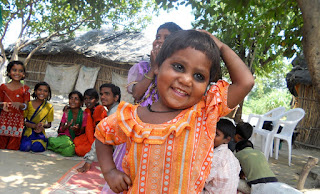 The new education policy(NEP) is on the anvil. A fancy website invites citizens to participate in its formulation. Consultations and meetings are being held from village to State level. Every one and anyone is invited to the show i.e the drafting of the education policy that will steer the lives of our children for the years to come. Wonder why I feel a tad discomfited. This is the future of our children and hence of our country we are talking about.
The new education policy(NEP) is on the anvil. A fancy website invites citizens to participate in its formulation. Consultations and meetings are being held from village to State level. Every one and anyone is invited to the show i.e the drafting of the education policy that will steer the lives of our children for the years to come. Wonder why I feel a tad discomfited. This is the future of our children and hence of our country we are talking about.
Last week a prominent TV channel aired a kind of curtain raiser to the draft that is one is told to be unveiled soon. The Drafting Committee is headed by a retired and respected bureaucrat. He candidly shared some of the salient features of the NEP. I must say there was nothing earth shattering. Actually much of it felt sated an jaded. As a man becoming his age the Chairman of the Drafting Committee talked with a certain nostalgia of values and stories heard at Grandma’s knee but even Super Granny is no match to You Tube and its pals. We all agree we need to reinstate values and teach ethics and so on but all this has to be version Century 21! And therein lies the trick.
What truly saddened and shocked me was the suggestion that Public (private + rich) Schools should take on the task of ‘helping’ Government (poor) schools. To me this sole statement was enough to realise that once again we had headed the wrong way.
Seems like we as a nation and a society thrive on division. Division creates barriers. Barriers are never good. More so in education as to my mind education is the sole path to transformation. Education has to offer a level playing field. The moment you advocate one kind of school helping another the battle is lost. We have enough division lines be they religion, caste, social background and so on. School could and should be the space where all these are obliterated. Looks like this education policy has not had the courage to do so. Our children have lost the battle. They will have again have to wait long years. I wait for the day when India will have a common neighbourhood school for everyone to walk to. Am I waiting for Godot?
During the show what transpired was a sense of confusion mostly due in my opinion to the overload of suggestions and submissions that the Committee had received and that they probably felt needed to be looked at. Now you will agree that there are many stakeholders in Education and each will view the problem from their perspective. To give you a small example we at pwhy have to battle with parents who ask us to ‘beat’ their children if they do not do what is asked of them. It is an extreme example but I guess you get the point.
For the policy makers it looks good to have mass participation and probably is also a sound election ploy. Everyone from village to state is involved. The question that needs to be asked is whether each of them have the interests of children at heart and the ability to view the problem in its entirety. I would tend to say no.
The question is not as overwhelming as it seems. Sometimes one simply needs to look at already existing policies and tweak them according to the needs to the day.
I have always been terribly impressed by the FOUR PILLARS OF LEARNING enunciated in 1996 by Jacques Delors namely : Learning to Know, Learning to Do, Learning to Live Together, and Learning to Be. A sound education policy would be one that adapts these Pillars to the reality of the day and gives them equal space at all levels of education from pre school to higher education. This comprehensive education does not stop at imparting knowledge and skills but goes a step further to integrating them within the society in which the child has to live and not forgetting to development of the child itself.
Education today cannot be viewed in isolation. More so when families are losing the role they once played. Today school plays an important role in forming the child as a person and a citizen. Moreover education today has to keep up with the other sources wherein the child accesses knowledge – the Internet for example – and be in a position to steer the child in the right direction. Today it is no more EITHER OR but how to combine the two in the best manner possible. It is a huge challenge but one we must take had on for the sake of our children.
I agree that values learnt and Nana’s knee were invaluable but today these are passé. Simply reintroducing moral studies with the stories we learnt from would be laughable. What is needed is a huge makeover and coming up with stories that would talk to today’s children.
When I look at the books the children study from, and believe you me I have done so umpteen times when I wear the Maam’ji cap and help with Popples’s homework, I wonder how they can hold the interest of the net savvy kids of today. Books need to be rewritten but by people who understand children and accept who they have become. Someone needs have the courage of spring cleaning all lessons. Do our kids really need to learn tables till 20 now that we have the decimal system? A good way would be to assess what we actually remember and use and what we have forgotten. In some countries calculators are now accepted in examinations, maybe we should do that. An error in calculation is no reflection of a child’s intelligence.
When I sat for my IAS examination, I had a job and was a young mom. I was willing to study subjects and comprehend them but was aghast to know that I was expected to learn a plethora of statistics for the viva voce. These were annual production stats that lost their relevance when they year ended. There was no way I would do this. Needless to say many told me that I would never make it. The day dawned and after a few niceties the Chairman of the Interview Board, without looking up asked me what the steel production of India was and I simply answered that I did not know. He asked a few more questions and got the same answer. He finally looked up and asked in an irritated tone what did I know. I looked straight into his eyes and answered him that I knew the names of all the yearly publications that carried this information and would as a responsible officer ensure that these were available in my office. A huge laughter across the room told me that I had succeeded.
Education is meant to build confidence in every child. That confidence is what will make her walk the right path even if she has to walk it alone.
Light up a Child’s Smile
Light up a Child’s Smile is a new campaign launched by the Mamagoto restaurants across India. This wonderful venture is the result of serendipitous synchronicity. Yesterday when I received the long anticipated call tell me that WE WERE LIVE, my thoughts travelled back to where it all began almost a year and a half ago.
A dear friend and mentor told me recently that the universe always conspires to fulfil your dreams even if we mere mortals give up on them too easily. What you ask with your heart is always granted, even if you may have forgotten your prayer.
From the very outset my dream was to create a large and varied donor base who would give tiny amounts to make our work possible be it the one-rupee-a-day campaign that we launched long ago or the various attempts at getting restaurants owners to add a tiny rupee to their bill. In the later case I remember being gobsmacked when the owner of a chain of restaurants asked me in all seriousness what he would do if five years down the line someone objected to the rupee parted with and pressed charges. Needless to say I was speechless. Come one ONE RUPEE or 0.015 cents. There are better ways to refuse Dear Sir! I can look at it with humour today but it was not the case on that fateful day. Were you to take out a rupee from a beggar’s bowl it would not make a difference. But my marketing skills were poor I guess.
In the same line we decided to hold a raffle where the prizes were: a meeting with a top star, a colour TV and so on and I managed to get an entry to my Alma Mater’s fair hoping to sell tickets by the dozen. We did not even sell one dozen. We were no match to the Tarot card reader at the next table.
We did have our share of silver linings; they came from over the seas!
We managed to secure some regular donors and even sunk into a comfort zone till we were rudely jolted out of it and run helter skelter.
The Universe on the other hand does not move post haste and also does not forget the messages it receives. It also operates in its inimitable manner we humble humans call synchronicity. A little before we received the news of a large regular donor backing out, the Heavens had begun setting the stage. Mid last year I came to know about the raw food diet and wanted to learn more. An email, a phone call and a meeting was all it took to establish a bond with a wonderful human being who felt like a soul sister. A few months later she even managed to get the recluse into a party outfit and come to dinner. Serendipity found me seated next to a young man who I learnt owned chain of restaurants. I almost fell of my chair when he told me that a good fund raising way was to add a fixed amount to bills! And his idea was TEN not ONE Rupee! Time stood still for a instant. I was hearing myself in an earlier avatar.
I had forgotten about this option but the Universe had not!
It took a few months to set it all up. But we are in business now.
A new world has opened up to Project Why.
For me meeting this wonderful young man who has a heart as big as the Universe is precious. It validates my belief in human kind. Everyone has a good heart; they have simply forgotten how to use it. It is time we helped them do so.
Hunt for empathy
I recently read the review of a children’s book titled The Avrah Stories by Abu Abraham. What caught my eye and I guess my heart was the closing line of the review: and he teaches his little readers a lesson that you are never too young to learn: the importance of empathy. I have been trying to get my hands on a copy of the book but with no success till now. What truly grabbled me was the word ’empathy’ one that is sadly missing from the lexicon of too many of us, young and not so young.
Of all the definitions of the word EMPATHY the one I like best is this one: to ability to step into the shoes of another person, aiming to understand their feelings and perspectives, and to use that understanding to guide our actions, not to be confused with pity or kindness. Empathy has to be nurtured throughout life, more so when we find ourselves in the face of adversity. But the seeds have to be sown in tender minds something that sadly does not happen anymore.
When I look back at my own life I am surprised at the fact that I cannot remember my first lesson in empathy though I remember feeling empathy when I was tiny, maybe 3 or so. Even today I feel tugs at my heart when I remember hazily the man and his dancing bear that my nana had called to entertain me. It was not the bear and his antics that I saw, but the thin man in a threadbare shirt in the freezing cold. I had surreptitiously walked into his shoes. The show ended when my tears compelled my grandparents to find the man and give him an coat. I on the other hand carried that ‘ability’ and fine tuned it over the years.
So where do these lessons come from and why have we lost them?
It has now been scientifically proved that we are not only homo sapiens but also homo empaticus who have the ability for cooperation and mutual aid. Roman Krznaric feels that empathy can be cultivated throughout our lives and use it to transform society, something I totally agree with. Highly empathetic people have habits that they cultivate like: curiosity about strangers, challenging prejudices and discovering commonalities, trying on someone else’s life, listening hard and opening up, developing imagination and inspiring social change. I am humbled to see that these are pretty much habits I follow.
But to get to this point in life I have to thank many masters: my parents who led by example, the stories I heard at their knees, the innumerable amount of books I read and still read, the true life inspiring accounts I was told, the movies that made me cry, the undying belief that one could learn till one’s last breath and from any one no matter how humble, the gentle and correct admonishing by elders and teachers and so much more. From the look of it these are simple pursuits and occurrences and should be part of any child’s life.
Sadly that is not the case. Today children have parents who do not have time to tell stories, the box does that! Books mean school books and thus boring and a chore. Adults do not seem to care. Movies are violent and devoid of meaning, songs have no poetry, moral studies is passé and off the school curriculum and so on. There is no one to hold your hand when you stumble, no words to assuage your hurt, no one to set you back on course. You are at the mercy of a world where screens tell stories and search engines are your mentors. And this comes at a huge price one being abdicating your right to imagine and hence your curiosity.
The palette on offer is limited, the people that can help non existent, lessons to be learnt AWOL, how can empathy be fuelled. At best is lies dormant waiting for the miracle that could rekindle it. In the meantime the world has turned into a terrifying place where aberrations are no more exceptions but the rule.
As I write these words what stares at me is the frightening reality that we have no resources to carry on for long. Shut the door would be what most would suggest, and they do I tell you, some adding in good measure you have done enough! How do I tell them that it is in these times of strife that all the little and bigger faces of my project why family come to the fore and urge me to carry on. I can feel the hopes and see the dreams they dared to hold on to because we were there.
The problem is that most of those I approach I have shut their empathy and lost the key. True it appears at times propelled by a horrifying incident but soon slinks back into some tiny recess of the mind.
I have often asked myself what would get people to get out of their comfort zone and scream. It does not seem the be the rape of baby, the brutalising of a woman, the burning of a human being because you do not like what you think he ate, the killing of another because he read something you did not approve and so on. Each should rekindle our empathy but it does not. That is what we have become. I guess we are not even home sapiens: wise person. No wise person would allow any such aberrations in the society he called his own. And yet we live in one quite comfortably.
I am on a hunt, a hunt for EMPATHY.
The extraordinary will take care of itself
“Do not ask your children to strive for extraordinary lives.
Such striving may seem admirable, but it is the way of foolishness.
Help them instead to find the wonder and the marvel of an ordinary life.
Show them the joy of tasting tomatoes, apples and pears.
Show them how to cry when pets and people die.
Show them the infinite pleasure in the touch of a hand.
And make the ordinary come alive for them.
The extraordinary will take care of itself.”
William Martin, The Parent’s Tao Te Ching: Ancient Advice for Modern Parents
2015
Miracles happen everyday
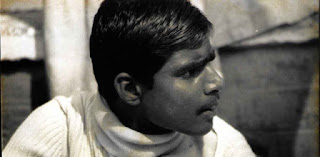 It has been a long time since I wrote this time not for want of thoughts to be shared but rather because of an onslaught of emotions that needed to be processed to make any sense at all. All this was further compounded by the blues that sets in each time a year ends, more when you are well entrenched in the last mile of your existence when time is no more your friend and seems to run at a new found speed. Probably it is that very thought that propelled me to pic up my virtual pen again.
It has been a long time since I wrote this time not for want of thoughts to be shared but rather because of an onslaught of emotions that needed to be processed to make any sense at all. All this was further compounded by the blues that sets in each time a year ends, more when you are well entrenched in the last mile of your existence when time is no more your friend and seems to run at a new found speed. Probably it is that very thought that propelled me to pic up my virtual pen again.
Today let us talk miracles. Yes about these ‘occurrences’ that happen everyday should you allow yourself to look with your heart. The reason I feel the need to do so is because lately I seem to have been the one who relied too much on my eyes. It seems a human failure to rush to the dark side when faced with adversity. All lessons seems forgotten even the one learnt at a father’s knee when things were bad and the loving parent told you about the big picture that one could never see in its totality. It is sad that all it takes is a small hiccough to wipe away wisdom.
 As I browsed project why pictures yesterday – something I often do when I need a lift – I stumbled upon this picture of Manu and Father Xmas. It took me back several years to the time when a young passionate German volunteer decided to be Santa for our kids. Seeing Manu and Santa together was nothing short of an epiphany as I suddenly realised that Manu was my very own Santa who had come into my life one fine morning with an invisible bag of miracles he handed out when the moment was ripe, and this year after year till the day when five years ago he left us quietly. His time had come. But had mine? True I knew that the only way to repay the debt I owed him was to carry on, but here again I relied on my eyes forgetting the heart.
As I browsed project why pictures yesterday – something I often do when I need a lift – I stumbled upon this picture of Manu and Father Xmas. It took me back several years to the time when a young passionate German volunteer decided to be Santa for our kids. Seeing Manu and Santa together was nothing short of an epiphany as I suddenly realised that Manu was my very own Santa who had come into my life one fine morning with an invisible bag of miracles he handed out when the moment was ripe, and this year after year till the day when five years ago he left us quietly. His time had come. But had mine? True I knew that the only way to repay the debt I owed him was to carry on, but here again I relied on my eyes forgetting the heart.
The last year has been a merciless one. Few know how difficult it has been to keep our doors open but closing was no option and we soldiered on as every time we reached the brink, someone threw us a plank! How did I not realise that it was yet another miracle from Manu’s invisible bag. All it took was to open the eyes of my heart.
The past few months have been filled with Angels and Miracles. True they did not having wings and did not descend from the heavens above, but came in different shapes and sizes and from across continents. I thank them all from the depth of my now wide open heart. I feel humbled and blessed.
Yes miracles happen everyday. They are the hands that reach out to you when the need arises, the mark sheet held with pride, the hug you never asked for and the selfie taken with someone now as tall as you but that once was a little scalded bundle swathed in bandages his eyes filled with pain. Who says miracles do not exist; look with your heart and you will be amazed.
Merry Xmas
Don’t lose faith in India
Don’t lose faith in India were the dying words of my father who left me twenty three years ago. He died a few days before the destruction of the Babri Masjid. I am glad he did.
Over the years I have held on to the words of a father I adored in spite of all adversities and because I knew he was always right. Was he not the one who explained life’s bad times to a child with his big picture theory where bad moments were simply the dark blotches in a large and beautiful canvass. With are limited vision we only saw them. Happiness lay in your ability to imagine the full-blown image. So I held on to that image in spite of stark realities of children dying of malnutrition, of rapes and abuse, of hunger and cold. I held on to the invisible colours whilst trying to address what disturbed me to the best of my ability and finding my little patches of light and sticking them on the dark spots. These little sparks were in the shape of a child’s trusting smile, of a report card handed with pride, of a box of sweets in celebration of a new job. I must say I found them in ample measure and they helped me soldier on.
A day or so ago a furore took over the social and regular media. A celebrity shared his concern about tolerance and his fear of bringing up his kids in India. Frankly I feel that too much has come out of his remark and become fodder for political agendas as is always the case. Come on, even I have said in the privacy of my room that Delhi has become unlivable with its pollution and but that does not mean I am packing my bags.
As luck would have it, I visited the Yamuna Project yesterday and spent some time with the kids. If there was any iota of a doubt about my faith in India, it was set to permanent rest as I laid my eyes on little Priya. She is the youngest of the brood and was the reason we started a class for tiny tots as she would come everyday with a copybook and claim her place in the sun. Take a moment and look at the picture. Her eyes reflect unending dreams that she may still not be aware of but that we can easily unravel. Her smile is infectious and her determination incomparable as she leads leads her class in English counting. She is confident and striking. But look at her hair. They seem streaked. But that is not because of some costly hair treatment but because of her severe lack of protein. Priya, like all her classmates is under nourished, something we are trying to counter on a war footing as past a certain age, the damage is irreversible.
That is not all. Priya and her friends do not exist as they do not have birth certificates or appear on any enumeration. They are invisible. And yet these kids are the brightest you can find, each displaying a insatiable hunger to learn and learn more, knowing intuitively that this could be the door for their dreams to be unleashed, dreams they carry in their eyes, dreams they have entrusted to us, dreams that give meaning to the my father’s words: don’t lose faith in India.
How can one faith lose faith in India as long as little Priya has dreams in her eyes.
I for one, can’t.
In God knows whose name? #paris#attacks
I am still stunned! It has been almost six hours since a phone call from my daughter informed me of the terrorist attacks on Paris. I am still trying to make sense of it all. Perhaps writing the thoughts that are choking me will help assuage the turmoil. As I hear the news, read the headlines and see the disturbing pictures my mind travels to and fro. Is it really Paris? The Paris I have loved from the time I mouthed my first logical babble. How can I forget the fact that one of the first songs I sang was Josephine Baker’s J’ai deux amours:
which would translate as:
Will it be heard? #children, India
It is Diwali time. A time to rejoice and be merry. It is also that moment in the year when Hindus pray Lakshmi, the Goddess of wealth beseeching her to grace their homes. This is a ritual taught to me by my mother and one have followed over the years diligently. But never has it held as much meaning as this Diwali when I stare at empty coffers wondering how I will be able to keep these kids smiling tomorrow and the day after.
In the past we at project why have been close to the brink but were always saved in the nick of time and once again I was hoping for just that. But it has not happened.
I have left no stone unturned in my quest for support. Many things are on the anvil but may take some time. Many promises were made but still not fulfilled. I of course will not give up. How can I?
But today I know that I need divine intervention and that is why this Diwali a very special prayer will be murmured to Goddess Lakshmi. It will be a prayer mouthed by an ageing woman chosen to craft the morrows of thousands of kids who needs help to fulfil her mission. Will it be heard?
Affects Eternity
Henry Brooks Adams wrote: “A teacher affects eternity; he can never tell where his influence stops“. This is something we seem to have forgotten. Yet this is so true!
I understand the third National Education Policy (NEP) is about to be drafted. It’s mandate is to: assess the status of the present education scenario, review the impact of the 1986 policy and the amended education policy of 1992, assimilate the feedback based on grassroot-level consultations and draft a new one keeping in mind the changed social, economic and technological context. Perfect on paper and in spirit but what frightens me is the news that the Draft will be ready by the end of the year – December -. The Committee is still being finalised. This post was not meant to be a ranting on yet another policy whose fate one can easily guess. India is replete of good intentions, perfects pieces of legislature, super sounding schemes and social programmes. The problem lies in their implementation. If I was ever given a chance to do something for the country I would first an foremost ensure that all existing projects run. Pipe dream of course!
For the last few days or more I have been meaning to write about the question du jour : tolerance; about crimes against children; about the rising graph of crime in general; about tens of thousands of people applying for a handful of jobs and so on. Perhaps I should write about all of them together as whichever way you look at the problems, there is only one true answer: education.
What the child learns will affect his life. As Jacques brazen wrote: “In teaching you cannot see the fruit of a day’s work. It is invisible and remains so, maybe for twenty years“. The seed planted within the home and in school will take time to grow and bloom. It is time we looked at things in a proper perspective.
The new draft policy has a huge task before it: reviewing impacts of past policies, assimilating feed back from the grassroots and keeping in mind the changed social, economic and technological context. From that they need to distill what will be the seen that will be planted in future generations.
A daunting task to say the least.
I have been an insider in the matter for the past 15 years. I remember the day when a young class VIII student came to me with her English school book and asked to underline. It took some patient prompting to understand what it was all about: in the English class the teacher barely read the text (in the occurrence an extract from Wilde’s Happy Prince), proffered a short summary in Hindi and proceeded to tell the children to underline the relevant portion question wise. In the tests and exams the kids simply had to mug up the underlined portion and regurgitate it as best they could. No wonder the young girl was lost. No one had told her what to underline.
You may think that 15 years or so down the line things have changed. Yes they have but not for the better. Actually the scenario has worsened. In state run schools, classrooms designed for 50 kids have over 100 packed into them. Now even Wonder Teacher cannot do much when a period is just 35 minutes.
There are so many things that need to be addressed but if there is one thing children do not have is TIME. So whereas policies are welcome, I feel that the need of the hour is immediate remedial measures.
First and foremost we need to address the learning process and ensure that children understand what they are being taught. That of course touches upon the quality of the teacher issue and again that is another ball game.
Is there a magic formula that may help kids in school today as those are the ones I feel for the most. Let me tell you why. What most do not realise is that children today, rich or poor, have been invaded by an insidious source of information that is flooding them with data: IT. Every one possesses or has access to a smartphone. The problem is that there is no one to hold their hand through the assault and help them process the information. With hormones raging this is a true recipe for disaster: teenage pregnancies to eve teasing.
The one solution one could apply asap is access to mentors in schools of all hues. This does not need to wait for new policies to be executed. It does not require training of zillions of teachers either. What you need is identify people who could reach out to these kids. The ideal would be counsellors but to me a simple mom, a concerned soul or a gentle grandpa with the right approach could be just as good.
The children need to feel cared for and loved. That is one battle won. They need to be appreciated and valorised. Second battle. They need to feel that there is someone they can share everything with and not be chastised but guided. They need hear about positive things. These kids have no role models at all. We have to craft some for them.
The other need of the hour is the immediate introduction of sex education from an early age. There is no option and it is time we realised that. Beating around the bush will not help. There is no place for detractors.
Pipe dream again? I pray not.
Don’t lose faith in India
‘Don’t lose faith in India’ were the dying words of my father when he breathed his last almost a quarter century ago. He was 80+. He was the descendant of an indentured labourer who had left his home land in the late XIX century. The reasons for his departure are as picturesque as your imagination would let you believe. Whatever they be, they compelled a man to leave everything and accept being enslaved and bear a number. His was 354495. He managed to secure his freedom and build life once again with determination and success. I am proof of that. Forgive this aside but it needed to be said.
Papa died a few days before the demolition of the Babri Masjid. I am grateful for that small mercy as it would have broken his heart and maybe who knows shaken his faith, the very faith that I consider a legacy. Had I remained ensconced in my comfortable, ordinary and insipid life, it perhaps would have been easier to hold on to that faith, but I chose to walk the untrodden path that questioned that faith far too many times and needed me to hold on to it drawing on shreds of logic and passion. But hold on I did as I could not forget the sacrifices my parents made for the country they loved unquestionably. My mom was even willing to sacrifice motherhood to the alter of freedom. She chose to give me life in a free India thus making its freedom sine qua non to my very essence.
I grew up on foreign shores but the love for India was lovingly woven into the fabric of my heart and soul by my two love stricken parents. The image of India that is seared in my heart is one of a land of tolerance, understanding and humanity. My parents never failed to teach me to respect the culture and values of the countries I grew up in and to me Indianness meant all embracing. I was proud of my heritage.
For the past years I have slowly had my faith put to the test. I held on to it. When the going was too tough I shut my eyes and remembered my parents or looked deep into the eyes of a very deprived kid and knew I had to carry on just for that child.
We humans are strange bods! We have the capability of getting inured to things and even stop seeing them. I guess that happened to me too as I saw a beggar child, read about a rape or a killing and turned to my fragile coping strategies. But recent events have shook me to the core, as all the values that made India what she is, seem to have been hijacked and are being mercilessly destroyed.
Where is my tolerant land?
Today you are killed because someone suspects you of eating something that ‘their’ faith finds offensive. Today a baby can be burnt alive because someone in her family did not do something another asked him to do before she was even born. You can have your face blackened for reading the wrong book, seeing the wrong film; you can be harassed for the clothes you wear, the drink you consume, the game you watch and so on. Intolerance is the flavour of the day and you better get used to it. Your life has been hijacked.
So where to you go to keep the wavering flame of your faith alive? The usual coping strategies seem to be floundering. New ones need to be sought if you do not want to live your life in fear. One option is to be fatalist and we Indians are privileged as we have karma to explain what cannot be. But what is the karma of a two year old that is brutally gang raped? Another option is to hope that someone among those who steer the country will intervene and say: ENOUGH but sadly that too seems to be a chimera.
You look helpless and almost hopeless for some ray of hope as you surreptitiously find yourself reading what you wrote twice over lest it upsets someone, something you never did before in a land where freedom was your right. Alas today freedom takes on a whole new meaning with far too many caveats. You want to scream, to rant, to rave, to shout: STOP.
We are tired of the intolerance we see. We are fed up of the political games that surround every occurrence and never address the situation. After seven decades of Independence there are still 5000 children who die every day for want of clean water and adequate food, child labour and abuse flourishes, women are still second class citizens and millions are deprived of basic dignity.
But what I would want to say to those who hold us to ransom today is that you cannot kill the spirit of India. What your aberrations are doing is waking up the deadened consciences of far too many who cannot keep mute anymore. There is an anger slowly brewing, an anger that is breaking the seemingly impregnable walls of comfort and finding its voice.
India is a blessed land. Let us not for get that, and yes Papa, I for one will not lose faith in India till my last breath.
The very first part in healing is shattering the silence,
The horrific rape of two toddlers, one age 4 and the other a tiny 2 has once again brought to the fore the disturbing issue of child abuse. I do not know how many posts I have written about this monstrous reality. One time is too many. Each time I sit down to pen my words I feel hopeless, helpless, sad, angry and terribly guilt ridden and tormented by my inability to do something to stop this horror. Erin Merryn wrote: The very first part in healing is shattering the silence. Her words ring so true as in India today we need to shatter the deafening silence; not only the silence that too often surrounds the victim in the name of some brand of misplaced honour, but the ear piercing silence of society as a whole. In the past week 3 toddlers have been raped! One is just 2 years old. She was raped by two juveniles age 17. They have been arrested and so have the perpetrators of the rape of a 4 year old. All lived in the neighbourhood of their tiny victims. Children are normally abused by friends and family. That is a reality we have to accept and own.
I watch with a sick feeling the usual drama that follows such abhorrent crimes. The pain of the family, the short lived anger of the neighbourhood, activities and society at large crying for blood, the rabid talk shows, the blame game where all that matters is who gains the maximum brownie points and photo ops, the slewof articles trying to find some logical explanation, the aberrations expressed by the guardians of patriarchal morality who are quick to lay responsibility on the victim and so on. Then the din stops. Some other occurrence gains the attention of one and all. All that remains if the silent pain of the mother and the quiet anger of the family.
The slow and inadequate legal system crawls in the emptied space and takes over. We are all aware of the dismal number of rape cases that see any trial let alone conviction at all. This happens again and again and again. I wonder why we have stopped asking the disturbing WHY.
I do not have awards to return or any such flamboyant action to register my intense distress. I just have this space and I use it again and again and again. Not doing is not an option.
The question I ask myself is why are the number of rapes and abuse against women increasing. And please do not talk to me about social profiling. The malaise is across the social spectrum. A friend recently told me about a game being played by three six year olds in one of the most upmarket school where two boys pinned down a girl (all classmates) and parted her legs and then declared she would have a baby. These kids were from wealthy and educated homes. One often quotes promiscuity in the cases of slum children who live in one room spaces and thus see more than they should. I guess the kids in richer homes access inappropriate information in multiple ways too.
The bottom line for me is that the sex education, if there is any, has not kept pace with the day-to-day reality children of today live in. If at one end of the spectrum it is lack of time of the parents to guide their child through life, at the other it is lack of knowledge. In both cases parents are not fulfilling this aspect of child rearing.
And please do not come up with the No Sex Please; We are Indians quip, I am sick and tired of hearing about the hydra headed monster called morality! In today’s world sex education should begin at a very early age and accompany the child through her/his adolescence at least. A wishy washy lesson on human reproduction is not sex education.
The crux of the matter is age appropriate. This should be instilled in children as soon as possible. The morality preachers cannot put a stop to the hormonal upheaval that plays in every body, male or female. This is natural. What one can do is explain these and give the required and age appropriate skills to our young ones.
One also needs to explain to them the consequences of deviant behaviour and warn them’ but one also needs to absolutely stop condoning any inappropriate behaviour as was so well exemplified by one of our political stalwarts in his Boys will be Boys comment.
Our society is going through a difficult phase with the advent of information at the speed of light. Everyone has access to the net, to social networks, to You Tube and so on. What we do not realise is that what is seen as a tender age and not processed in the right manner can lead to disaster.
These boys were caught and will get what they deserve. Will the punishment serve as a deterrent. The answer is no. That is because the punishment will take time, and with children time is something we do not have. You cannot begin to imagine how many little girls will be molested by raging young hormones and never tell the story.
We need act now.
Today’s children do not read books that are inspiring; they do not have role models in their parents or teachers; moral studies is off the school menu; sex education is taboo. No one has time for them.
We have to as a society, as a political dispensation, as an education institution and as a family find quality time for our children. That would be the first step to breaking the silence and healing society.
Imagine she was yours.
A four year was most brutally raped and left to die a few kilometres from where I sit to write this post. I need to be graphic today in the hope that the horrific details may awaken our benumbed consciences and deadened souls that too often remain mute when faced with child abuse, a crime that has not place in any civilised society. The problem is that this child was poor, and anything qualified as poor leave us indifferent. Yet I will tell her story. This little girl was raped, sodomised, bitten, hit with stones and left to die. All it took to lure her was a packet of noodles and a paltry ten rupees. Then man had planned to throttle her but had to run away as he hear voices. The child managed to crawl back home to tell her story. Imagine her pain. She is alive but barely as every single part of her tiny body has been mutilated: she has several genital injuries a torn rectum necessitating a colostomy and has cuts and bite marks on her face, abdomen and chest. Doctors say she will need six months before she recovers. But the scars on her soul will never heal. In the words of Herbert Ward: “Child abuse casts a shadow the length of a lifetime.”
The statistics of child abuse and child sexual abuse in India are staggering and having reached epidemic proportions. 48,000 child rape cases were recorded from 2001 to 2011 and India saw an increase of 336% of child rape cases from 2001 (2,113 cases) to 2011 (7,112 cases). (Asian Centre for Human Rights report 2013). One child gets raped every 76 minutes. Do you understand what that means! I do not think so as if we truly did we would be up in arms. The reason that we, who have the power to change things do not budge is that most of these tiny victims are POOR so faraway from our reality.
My thoughts take me to the closing scene of the moving movie A Time to Kill, where the defence attorney describes to a all white jury in slow and painful detail the brutal rape of a little black girl and then in the final words of his summation simply says: and now imagine she is white!
I ask you to do the same thing. Imagine this little girl lying alone and mutilated on a hospital bed was yours.
We seem to be reacting at everything these days. Eminent personalities are returning their prestigious awards to mark their protest against intolerance. Everyone is talking tolerance and freedom of speech and thought.
Can a society be called tolerant, free and even sane when it allows children to be raped and mutilated and abused in all ways and perpetrators to go free.
I just ask you to imagine she was yours.
when the gratitude begins.
The struggle ends when the gratitude begins wrote Neale Donald Walsch. We tend to forget this indubitable truth. Come one even I whose email signature bye line is: I am busy being grateful, don’t remember to be: grateful! Grateful to the one who gives unabashedly when you ask. I chose to illustrate my post with this picture as it has a story worth sharing. My little bloke would have been at best 5 when this incident occurred. I had the mother of all headaches and nothing was helping. Utpal was in the kitchen eating some wafers and asked me how I was. I told him my head was hurting. Without batting an eyelid he folded his pudgy little hands and shut his eyes tight and stayed like that murmuring to himself for quite some time. Then when he was ready, he quietly and solemnly took a chip and gave it to me: I have asked God to make your head stop hurting, you just eat this chip! I guess God hears the prayers of little souls and my headache vanished. I guess for us adults, it comes with a rider: first you thank me for all I have given, then I will give what you seek.
All this to say that a last week, our Finance Director whose words I often dread told me that finances were at an abysmal low – due to some sources drying and some delayed – and something needed to be done. Now this after a senior staff meeting where I had ascribed myself the role of mentor and handed over the reins in a matter of speak. As many know the biddy is unwell and prone to bouts of panic attacks for the asking. Hence the scary words had the required effect: a monster panic attack. This was followed by stress, restless night and the whole caboodle!
My mind was going all over the place and the the body reacting as expected. Hundreds of options were flooding my mind but none made sense and so the restlessness was at its peak. That is when I decided to call upon a friend and mentor whose simple words were: be grateful and God will show you the way.
This was like a bucket of cool water that brought me back to earth. I stopped. I prayed. I expressed my gratitude for everything that had come my way and above all for each and every time a miracle had come my way when I needed it most and Gosh I had forgotten how many miracles I had experienced. If I spent the rest of my living days on my knees, it would not be enough to express my gratitude.
The next day I sat down and wrote a few mails seeking help. I was not upset but strangely calm, as if I knew deep within me that things would fall in place. A few hours later an answer dropped in mailbox: it was another miracle, a most unexpected one.
All it had needed was for me to be grateful. The rest just happened.
Who says miracles do not happen?
Looking Away
I have borrowed the title of this blog from Harsh Mander’s hard hitting book: Looking Away. The author himself summarises his book with the following words: it is about the need for people to care for each other, in other words not look away! The cover is stark and disturbing and makes you want to look away before your eyes fall on the bye line: ‘Looking Away, Inequality, Prejudice and Indifference in New India.’ How easily we look away when faced with anything that disturbs our perfectly and carefully constructed life and what a sad reflection on our lives as we know subconsciously that it is as frail as a house of cards that would crumble if we dared open our hearts, so we keep it shut and as for the eyes, well we look away. We look away when we see a child begging at a street light; we look away when we see a child working in a shop or even in a ‘friend’s house, come on our house of cards stands on acceptance and conformity. We cannot say or do anything that would alter that. We look away when faced with a news item about anything abhorrent: women being trashed in public, kangaroo courts ordering rape as retribution; children being beaten to death. Gosh the list is endless. And this Looking Away Syndrome also translates in our refusal to part with a few pennies to help the other side of the fence: those who don’t look away. And to ease our consciences we come up with axioms like: All NGOs are crooks! And having ingrained that thought in whatever has replaced the heart, we set on finding new ways to spend our money. Even Depression is better than Donating!
For the past almost two decades I have born the brunt of this attitude and have had to look for greener pastures across blue seas. In 1998, I began my journey with the naive belief that I would be able to achieve my dreams by simply asking a small amount of people to donate one rupee a day! Biggest joke of eternity that left me shame faced. I then set out to seek people one supposedly knew, all page 3 material thanks to the social circle of the husband to give 100 paltry rupees a month. Some gave just for ONE MONTH! Some even had the cheek to ask the husband to give it to me! Once at a small party where everyone knew everyone and when we were collecting money for a heart surgery, I was stupid enough to ask those present to empty their wallets, in a manner of speech. All looked away. At a fair in my old college when we had a table selling tombola tickets where the first price was meeting a superstar, we sold barely a dozen of 30 rupees tickets whereas our neighbour who was a tarot card reader made a hefty sum. Looking away is now in the DNA of the Indian Rich.
As you know, a few weeks ago the dreaded meltdown hit and this is what I looked like metaphorically of course! Many suggestions were made and I followed them all: rest (haha), yoga, barefoot walking, healthy eating, meditating and I did them all. I also thought that the message from above was to let go and hand over all responsibilities to the team so that they could find their feet. Deflate the armbands in a manner of speech! So a meeting was held to do just that. On my part I was to heal myself and then taken on the role of a mentor. What was left unsaid was that I had to find another cause to fight for. All this of course rested on the premise that we had sufficient funds to allow everyone to find their feet. But my friend the God of Lesser beings had other plans and it was a day or so later that my Financial Director let out that we were dry. This of course is due to the fact that many regular donors backed out or cut their donations and one was not able to find a lasting solution so it had been a hand-to-mouth situation for a while. So all carefully made plans came crashing and I knew that at least for the time being I had to jump in the ring and provide sufficient oxygen. Maybe that was what the doctor ordered in my case and the face in the mirror looked a tad more normal, and the ‘writer’s’ block seemed to vanished.
In the past, I have always tapped my international network as the Looking Away Syndrome was too much to deal with and created more harm than good as it infuriated and riled me to a point that I became unproductive. But this time is a little different thanks to my meeting two wonderful souls (and I hope you recognise yourselves if you read this) who have everything that the Looking Away kind have but have one thing they do not: the heart and courage not to look away. These two blessed souls help us with abundant generosity and with no strings attached. They trust us.
So this time, I decided to make another valiant attempt at reaching out to those who have money with a caveat: I would take the help of these two warriors.
Project why with its 1000+ kids and 45+ staff does not require much to run. It can be divided into 15 modules each costing less than a pair of shoes or a bag at a upmarket mall or a dinner for 4 at a restaurant. Even our most expensive centre is less than what a bunch of young rich paid for drinks according to the article. Imagine now the same amount spent on: providing a safe and secure and happy place to 20 children and young adults with disabilities who are rejected by their families; teaching them a skill that would ‘buy’ them some dignity within their own family; take them out to parks and open spaces a far cry from the holes they live in; provide them medical care and counselling and more for ONE WHOLE MONTH. Does the equation balance? One evening against one month.
So my next task is to make the Project Why Menu where each ‘dish’ will have its price of course and a description of all the ingredients that make it delectable.
I hope it will work because it is not only a matter of project why children but also a way to get people not too look away and see that what they experience in return in far more than the most expensive thing that money can buy: the smile and trust of a child.
So help me God and his 2 Angels!
In the corner of my heart
For the past 10 days we have been flooded with the twist and turns of a high society crime , twists and turns which would beat the imagination the most prolific crime writer. And it is nowhere ended. Wonder what other skeletons will pop out of dark cupboards. It has even caught the eye of foreign newspapers! A master whodunit. In all the coming and goings, the hidden faces some under headgear that resemble the KKK, lies a sad story: that of an unwanted child murdered in the prime of her life for greed and ambition. Imagine being abandoned by your parents when just a toddler and then when you enter your youth being told not to reveal your relationship but pose as the sibling of your mother. And then when you become too much of an embarrassment or impediment, you are slain, hacked, burnt and buried and not missed for three long years. That is in short the story of the young girl who is making the headlines. What is tragic is that no one is truly mourning for her as one should for a life so brutally taken.
This morning we were told about a diary this young girl allegedly wrote when still a teenager. Diaries should remain private but in this case it becomes the young girl’s voice, a voice otherwise unheard. In the diary she writes of loving and hating her parents, even the father who washed his hands off her. And what is most poignant is that tiny entry about her mother where she says: she is in the corner of my heart.
These words brought to mind the often unsaid words of a little boy I love and who too was abandoned by his mother and has no clue about who his biological father is. He has memories of his mom of the times when he was a toddler and she cared for him. But she too had other ambitions and pursuits that were fare more important than caring of a child. And she took off, coming back sporadically when she needed to use the child to fulfil her needs. In her case too it was money, money to feed her addiction. She too met many men and ‘married’ them; the latest being a few weeks ago. The child who is now a strapping teenager has not met her for years but still carries her in the corner of his heart. For her she is the caring mom who plied him with biscuits his still favourite treat as any biscuit he eats is tempered in maternal love. Children never forget.
An abandoned child will often state that it hates its mom as hate is also a form of love. The real opposite of love is indifference and no child is indifferent to its progenitors.
It is strange how the story of these two women are akin in spite of the fact that they belong to opposite part of the social spectrum. Both were born in small towns and humble homes, both had children at an early age, children they left with their parents to hit city lights. Both had needs that were way beyond their means and both used men to fulfil these.
For the past days as this sordid stories unfolds my heart goes out to my little Popples who God was kind enough to entrust to me before more hurt could come his way. Over the years I have seen how his mother has been present in his inner most thoughts be it when he buys biscuits, has to make a family tree for his home work or asks for pictures to put up in his hostel room. But the image he carries in the corner of his heart is a far cry from the reality.
I do not know if my love will be strong enough to help him find healing answers to all the disturbing questions that still lurk around the corner.



